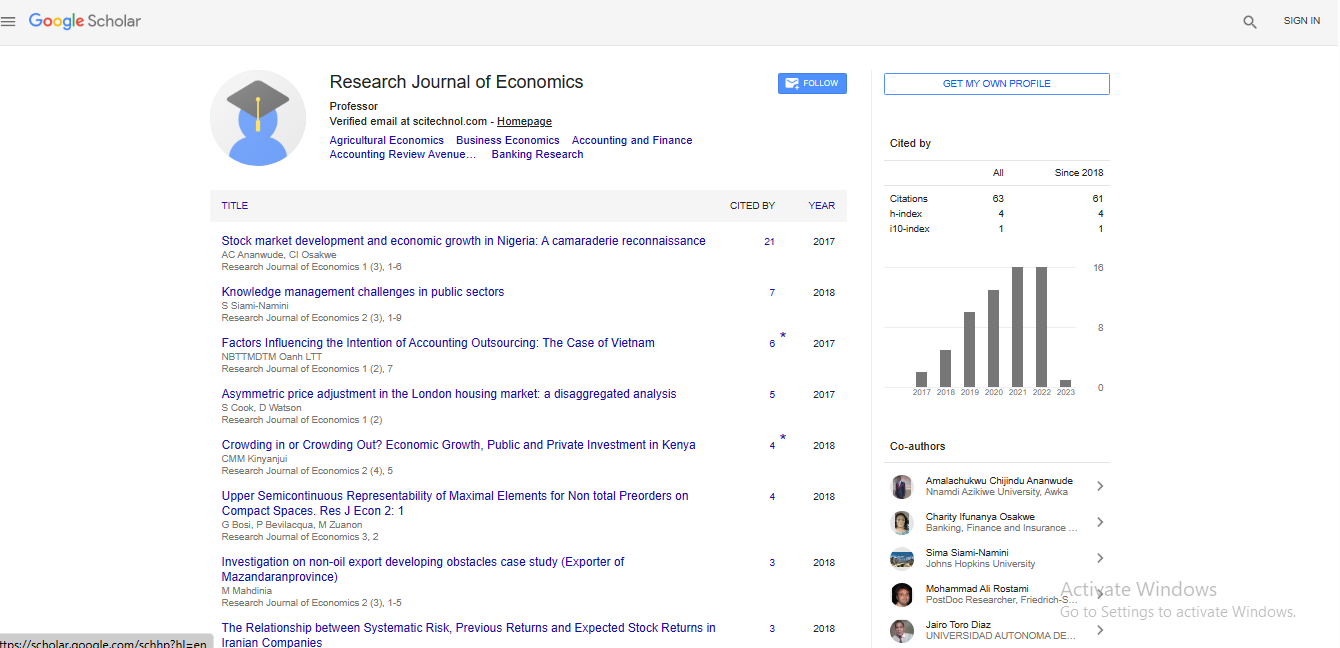Perspective, Res J Econ Vol: 7 Issue: 2
Understanding Gas Futures and their Role in the Energy Market
Malichan Nguyen*
Department of Economics and Finance-DEF.UP, School of Economics and Management, University of Porto, Portugal
*Corresponding Author: Adamantia Nikolaidi, Oncology Clinic
Department of Economics and
Finance-DEF.UP, School of Economics and Management, University of Porto,
Portugal
E-mail: nguyen.m@gmail.com
Received date: 16 February, 2023, Manuscript No. RJE-23-96599;
Editor assigned date: 20 February, 2023, PreQC No. RJE-23-96599 (PQ);
Reviewed date: 06 March, 2023, QC No. RJE-23-96599;
Revised date: 13 March, 2023, Manuscript No. RJE-23-96599 (R);
Published date: 20 March, 2023, DOI: 10.4172/RJE.1000135
Citation: Nguyen M (2023) Understanding Gas Futures and their Role in the Energy Market. Res J Econ 7:2.
Description
Gas futures are financial instruments that allow investors to bet on the future price of natural gas. As an important energy commodity, natural gas plays a significant role in heating homes, generating electricity, and powering industrial processes. The supply and demand of natural gas are influenced by a range of factors, including weather patterns, production levels, geopolitical tensions, and environmental regulations. Gas futures are one way for investors to manage the risk associated with price volatility and make informed decisions about their investments in the energy market.
Gas futures
Gas futures are contracts that allow buyers and sellers to trade natural gas at a predetermined price and delivery date in the future. The futures market provides a mechanism for hedging against price fluctuations and managing the risk associated with fluctuations in supply and demand. The price of gas futures is influenced by a range of factors, including current supply levels, demand projections, weather patterns, and geopolitical tensions.
Gas futures are traded on exchanges such as the New York Mercantile Exchange (NYMEX) and the Intercontinental Exchange (ICE). The contracts specify the quantity of gas to be delivered, the delivery location, and the delivery date. The delivery location can be a physical location or a virtual point representing a pipeline or hub. The delivery date is usually set for a month in the future, although contracts for up to two years in advance are available.
The role of gas futures in the energy market
Gas futures play an important role in the energy market by providing a mechanism for managing risk and facilitating price discovery. Natural gas prices are subject to volatility due to a range of factors, including changes in production levels, weather patterns, geopolitical tensions, and environmental regulations. Gas futures allow market participants to hedge against price fluctuations and manage the risk associated with their exposure to natural gas prices.
In addition to managing risk, gas futures also facilitate price discovery. By providing a mechanism for buyers and sellers to trade natural gas at a transparent price, the futures market helps to establish a market price for natural gas that reflects the current supply and demand dynamics. This price discovery function is essential for ensuring that natural gas is priced efficiently and that resources are allocated to their most productive use.
Benefits of gas futures
Gas futures offer a range of benefits to investors and market participants. One of the most significant benefits is the ability to manage risk. Gas futures provide a mechanism for hedging against price fluctuations and managing the risk associated with exposure to natural gas prices. This is particularly important for energy companies, who are often subject to significant price volatility in the natural gas market.
Another benefit of gas futures is the ability to gain exposure to the natural gas market without physically owning or delivering the commodity. This allows investors to participate in the market without incurring the costs associated with physical delivery, storage, and transportation of natural gas. Gas futures also provide a mechanism for speculating on the future direction of natural gas prices, allowing investors to profit from their insights and analysis of the market.
Gas futures are an important financial instrument for managing risk and facilitating price discovery in the natural gas market. By providing a mechanism for buyers and sellers to trade natural gas at a transparent price, the futures market helps to establish an efficient market price for natural gas that reflects the current supply and demand dynamics. Gas futures also offer a range of benefits to investors and market participants, including the ability to manage risk, gain exposure to the natural gas market, and speculate on the future direction of natural gas prices.
 Spanish
Spanish  Chinese
Chinese  Russian
Russian  German
German  French
French  Japanese
Japanese  Portuguese
Portuguese  Hindi
Hindi 